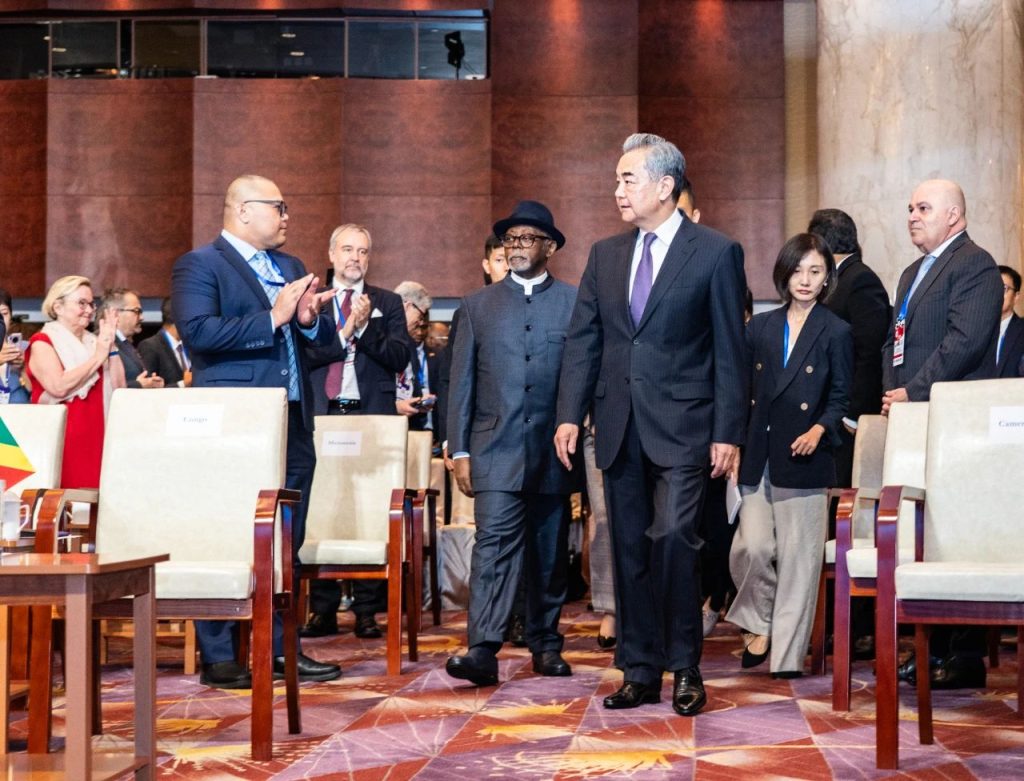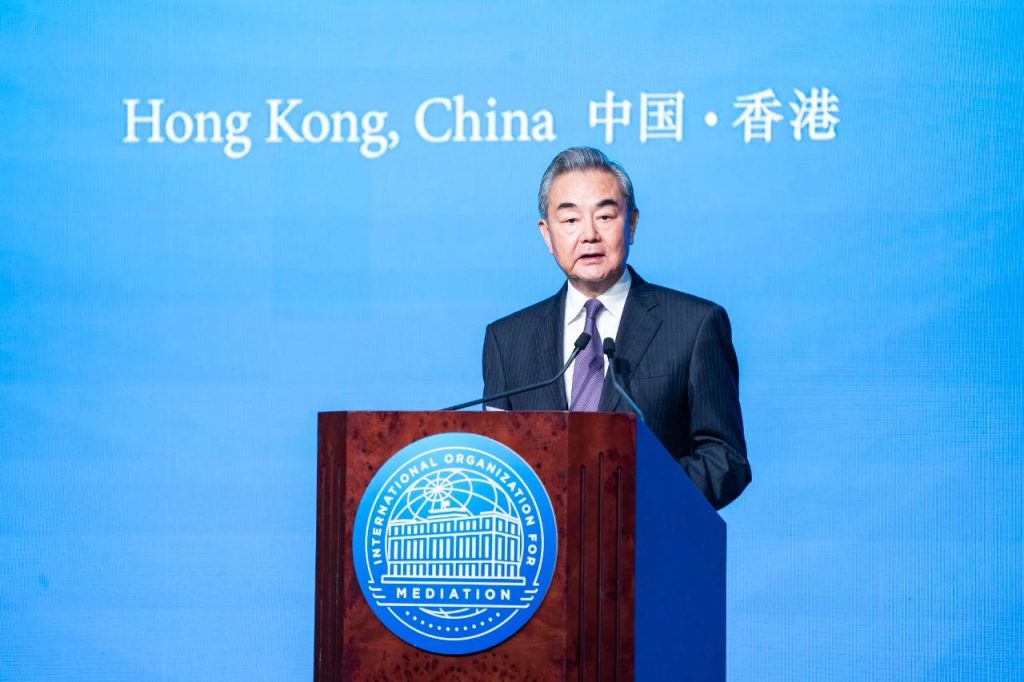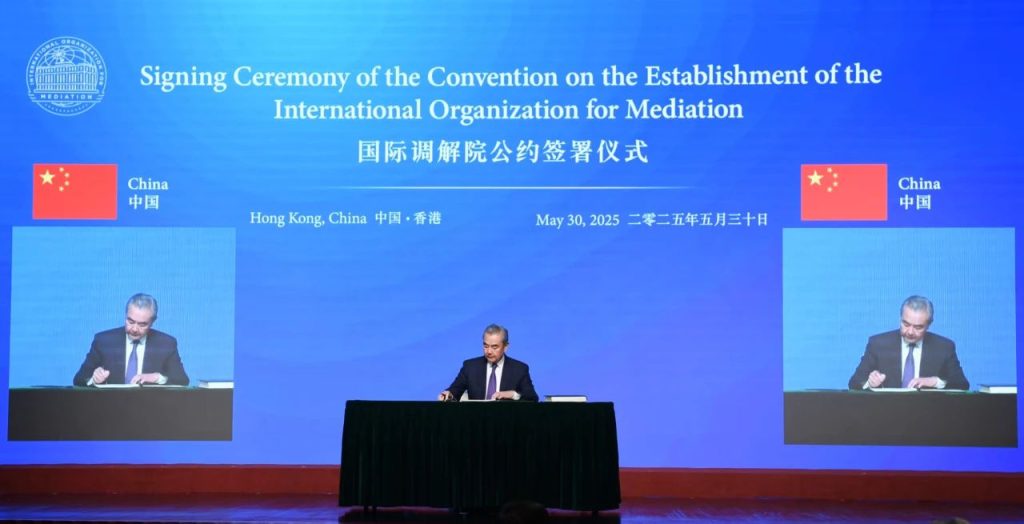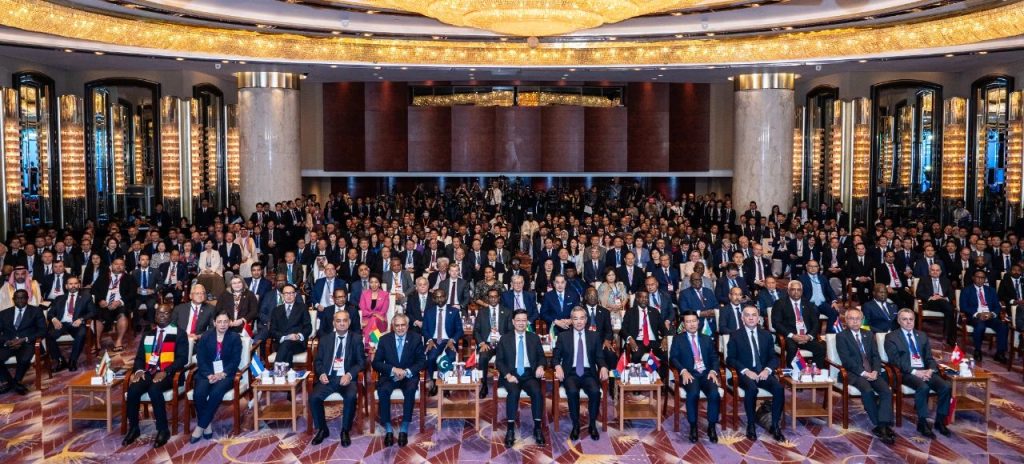
On May 30, 2025, the signing ceremony of the Convention on the International Organization for Mediation was successfully held in Hong Kong. Wang Yi, Member of the Political Bureau of the CPC Central Committee and Minister of Foreign Affairs, attended the event and delivered a speech. Approximately 400 high-level representatives from 85 countries across Asia, Africa, Latin America, and Europe, as well as nearly 20 international organizations, participated in the ceremony. Among them, 33 countries signed the Convention on site, becoming the founding members.
Wang Yi emphasized that the preamble of the UN Charter calls for nations to live in harmony and safeguard international peace and security. China has always advocated resolving differences in the spirit of mutual understanding and accommodation, building consensus through dialogue and consultation, promoting development through cooperation and win-win outcomes, and addressing problems with a forward-looking perspective. Three years ago, China and like-minded countries jointly proposed the establishment of the International Organization for Mediation. After unremitting efforts, the Convention was finally concluded, receiving broad support and active response from the international community. As an innovative initiative in the field of international rule of law, the establishment of the Mediation Organization is of great significance in the history of international relations. It fulfills the purposes and principles of the UN Charter, fills the institutional gap in international mediation, and provides an important legal public good for improving global governance.
The establishment of the Mediation Organization also embodies the civilizational wisdom of harmony and coexistence. It helps transcend the zero-sum mindset of “winner takes all,” promotes the amicable settlement of international disputes, and contributes to building more harmonious international relations. Moreover, the Mediation Organization highlights an inclusive legal civilization that respects the will of the parties, offering greater flexibility, cost-efficiency, convenience, and effectiveness. It complements existing international dispute resolution mechanisms such as litigation and arbitration, creating synergy and enhancing overall efficiency.

Wang Yi expressed China’s hope that all signatory countries will ratify the Convention as soon as possible and welcomed more countries to actively join. He called on all parties to uphold the purposes of the UN Charter, adhere to voluntary participation, equal decision-making, and mutual benefits, respect legitimate concerns of all parties, and achieve win-win cooperation.
He urged efforts to promote a culture of reconciliation, cooperation, and harmony, foster awareness of mediation, and quickly establish a set of independent, flexible, pragmatic, efficient, and globally leading rules and mechanisms for mediation. He emphasized the importance of fairness, justice, and impartiality, of upholding the true spirit of the rule of law, balancing procedural and substantive justice, enhancing the participation of developing countries, and increasing the representation and voice of the Global South in international governance.
He further advocated for extensive consultation, joint contribution, and shared benefits, and for solidly advancing the organizational development of the Mediation Organization to serve the world on a global scale. Wang Yi announced that, as agreed by the negotiating countries of the Convention, Hong Kong will host the headquarters of the International Organization for Mediation. He noted that Hong Kong’s return to the motherland is itself a successful example of peacefully resolving international disputes. With the strong backing of the motherland and its connectivity with the world, along with its unique advantage of accommodating both common law and civil law systems, Hong Kong is exceptionally well-positioned for international mediation. He expressed confidence that this rising star, the International Organization for Mediation, will grow together with the “Pearl of the Orient,” shining brightly side by side.

Pakistani Deputy Prime Minister and Foreign Minister Dar, Zimbabwean Minister of Foreign Affairs and International Trade Mutsvangwa, Nicaraguan Attorney General Morales, Serbian Minister of Justice Vujic, Swiss Foreign Minister Cassis, and UN Under-Secretary-General Li Junhua delivered speeches respectively. All parties highly affirmed the contemporary value and far-reaching significance of the Mediation Organization, stating that at a time of increasing global conflicts and divisions, its establishment is both timely and crucial, carrying historical importance. They noted that the Mediation Organization aligns with the purposes and principles of the UN Charter, embodies respect, mutual trust, fairness, and harmony, and is an effective move to strengthen multilateralism. It will become a key pillar in improving global governance and a new milestone in promoting the rule of law worldwide. They called for more countries to sign and ratify the Convention, and to work together through mediation to achieve lasting peace and sustainable development. Many expressed appreciation for China’s proactive role as a major country and looked forward to the Mediation Organization contributing to the peaceful resolution of disputes and promoting friendly cooperation among nations.
Chief Executive of the Hong Kong Special Administrative Region John Lee Ka-chiu also delivered a speech, welcoming the establishment of the world’s first intergovernmental international organization dedicated to mediation in Hong Kong. He said that Hong Kong will leverage the institutional advantages of “One Country, Two Systems” and fully support the work of the Mediation Organization.


